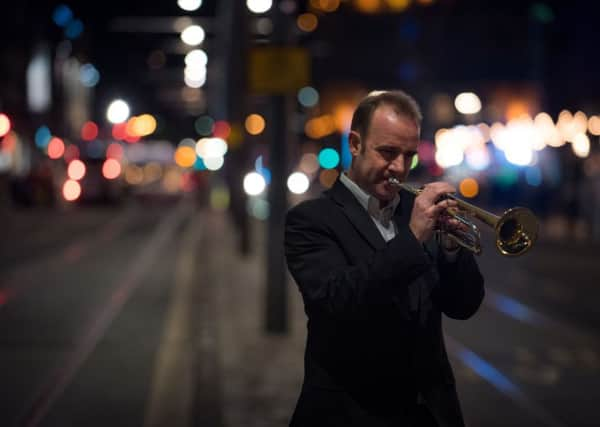Edinburgh Jazz Festival reviews: Jazz Centenary Gala | Colin Steele Quartet | Tommy Smith


Jazz Centenary Gala Concert 4stars
Festival Theatre
Colin Steele Quartet Play the Pearlfishers 4stars
Rose Theatre
Tommy Smith Plays Coltrane 4stars
Rose Theatre
The centenary of what is generally regarded as the first jazz recording is being widely celebrated this year – not least by the Edinburgh Jazz & Blues Festival which has a centenary thread running through its compendious programme, which also features the multifarious jazz genres that have flourished since that double “s” became a double “z”. Highlighting the anniversary with due flamboyance, however, was Wednesday night’s Centenary Gala Concert starring the New Orleans Classic Big Band – a score of musicians, mostly from the Crescent City, with a few Scottish jazz faces bulking up the ranks.
The billed singer Ingrid Lucia didn’t appear, making it a rumbustiously men-only affair, the ensemble, presided over by one and at times two totem-like sousaphones, led and compered by the highly affable, Satchmo-voiced singer and trumpeter James Williams – whose earthy vintage jazz outfit the New Orleans Swamp Donkeys broke away from the big band for a brief set. Williams mainly stuck to channelling Louis, doing so with gravelly relish, and combining exuberant trumpet work with that brief, wry reproach to racism in Armstrong’s Black and Blue. Vocalist and trombonist Michael Watson gave a smooth and soulful treatment to The Lush Life, while guest trombonist and singer David L Harris came out with limber bebop vocalising as well as making the instrument itself all but talk with some eloquent mute playing during Duke Ellington’s Mood Indigo.
Advertisement
Hide AdAdvertisement
Hide AdIt was the full ensemble, however, who drew the most enthusiastic audience response, as they snapped into New Orleans marching band mode, leaving the stage to create orchestrated mayhem in the stalls – a bunch of swaggering saints on the march.
If Williams and company kept the flame for vintage jazz, Tuesday night saw saxophonist Tommy Smith and his current quartet carry a torch, and with an elegant vengeance, for one of jazz’s later great innovators, John Coltrane, who died 50 years ago. Playing from their new Coltrane tribute album,Embodying the Light, Smith, pianist Pete Johnstone, double-bassist Calum Gourlay and drummer Sebastiaan de Krom opened with Resolution from Coltrane’s Love Supreme. When it comes to the grand gesture, they couldn’t have done much better than that, Smith’s magisterially calling tenor sax heralding a set that never let up in terms of musicianship and sheer energy, Smith’s full-throated horn and Johnstone’s athletic keyboard ranging prompting yells from a delighted audience.
There was the boppy bounce of the album’s title track and its evil twin Embodying the Dark, both by Smith, while Coltrane’s rangy setting of Summertime – with an expansive drum break from de Krom – turned up the heat in an already warm Rose Theatre, as did the powerful cascading of Transition, while the wildly lyrical ascent of The Father, the Son and the Holy Ghost was an incantatory masterpiece.
From jazz milestone to one of jazz’s more idiosyncratic manifestations: Colin Steele has won awards for his distinctively melodic and Scots-accented playing and composition. The previous night in the Rose Theatre, however, saw him, with his quartet of pianist and arranger Dave Milligan, ubiquitous bassist Gourlay and drummer Alyn Cosker, turning his attention to the music of the Scots rock band the Pearlfishers, also known for the melodic strength of material, and to whose recordings Steele had contributed as a session musician.
Sounding very much at ease with each other, the quartet played up the essentially tuneful and frequently cinematic nature of these compositions by the Pearlfishers’ frontman, David Scott (who took a bow from amid the audience). Opening with The Bluebells and following up with The Umbrellas of Shibuya, Steele stated the melodies with lean, clean phrasing, using muted trumpet throughout, with Milligan’s piano pulses and arabesques providing both exuberance and delicacy as required, Snow on Pines, for instance, chiming gently in working up to a satisfying climax before fading out.
Everything Works Out combined an unhurried groove which Cosker intensified over ringing piano chords, also providing a steady hiss of brushes and cymbals against which Gourlay unwound a conversationally muttering bass solo. Milligan brought some township exuberance to We’ll Get By while Steele sat out to let the remaining trio give a nicely pulsing rendition of Swan Dreams, before the re-united quartet brought the set to an up-tempo close, trumpet shrilling and piano maintaining jubilant forward motion. Everything, indeed, worked out.